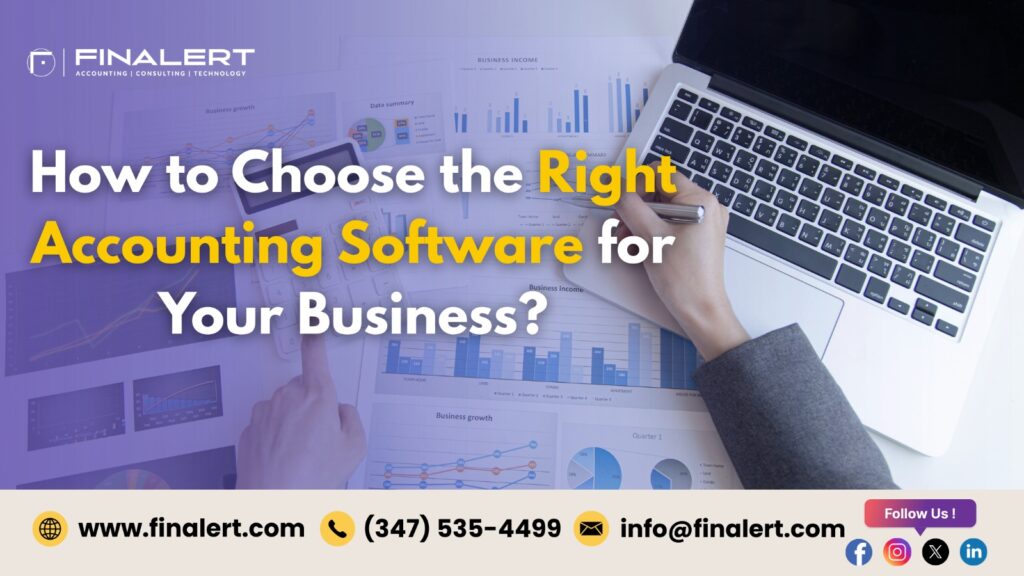How to Choose the Right Accounting Software for Your Business?
Introduction:
Accounting software selection is more important than ever in today’s fast-paced business world. The market is filled with countless options, so choosing a solution that meets the needs of your company can be very challenging. The right accounting software can streamline operations, improve accuracy and help you make informed financial decisions. On the other hand, the wrong choice can lead to unnecessary costs, inefficiencies and data errors.
This blog discusses the essential factors to consider when choosing accounting software. Our team can assist you in finding solutions that support your company’s growth, compliance and day-to-day financial management requirements.
1. Identify Your Business Needs
Accounting software should be selected after understanding your business’s particular needs. Are you a small start-up or a growing enterprise? Do you manage inventory, payroll or multiple accounts?
List out the key features you need such as:
Understanding your business’s structure and future goals will help you narrow down software that aligns with your operations and scale.
2. Consider the Size and Type of Your Business
Accounting solutions differ depending on business size and industry. For example:
Choosing software designed for your business type means that you’re not paying for unnecessary features or missing out on critical tools.
3. Ease of Use Matters
A user-friendly interface can save your team time and reduce errors. Complex accounting software with a steep learning curve may not be the best fit if you don’t have an in-house finance team.
Look for solutions with intuitive dashboards, guided workflows, and customer support options. Many software providers offer free trials or demos take advantage of these to see if the platform suits your working style before committing.
4. Cloud-Based vs. On-Premise Solutions
Cloud-based accounting software offers flexibility, remote access and automatic updates, making it ideal for businesses that operate across locations or require real-time collaboration.
On-premise solutions, on the other hand, offer more control over data security and storage but require manual updates and maintenance.
If your business relies on remote teams or you want hassle-free maintenance, cloud-based software is usually the better choice. Just ensure that the provider offers robust data protection and encryption.
5. Integration Capabilities
Your accounting software should seamlessly integrate with other tools you use, such as CRM systems, payroll services, e-commerce platforms, and banks.
Integration reduces manual data entry, minimizes errors and allows for smoother workflows. Before selecting a solution, check if it integrates with your existing technology stack or offers APIs that make custom integrations possible.
6. Scalability for Future Growth
It’s easy to choose software that meets your current needs but businesses grow, diversify, and expand. Scalability is an important factor to consider when choosing an accounting solution.
Ask yourself:
Choosing scalable software now will save you from migrating to a new system later, which can be costly and disruptive.
7. Security and Compliance
Accounting data is highly sensitive and containing financial records, client information and tax documents. Verify that your software provider follows strict security protocols such as data encryption, secure backups and two-factor authentication.
Compliance is essential. The software should be updated with the latest tax regulations and accounting standards relevant to your industry and region. Many providers offer automated tax calculations and audit-ready reports to simplify compliance tasks.
8. Cost and Pricing Structure
While budgeting is important, don’t base your decision solely on price. Consider the total cost of ownership, including:
Sometimes a slightly more expensive solution that offers better features and scalability provides greater value in the long run.
9. Customer Support and Training
Reliable customer support can make a huge difference, especially when you encounter issues or need guidance. Check if the provider offers multiple support channels such as chat, phone, email and knowledge bases.
Additionally, onboarding support and training materials like tutorials and webinars can help your team get up to speed quickly.
10. User Reviews and Recommendations
Research customer reviews and testimonials before making your decision. Look for feedback from businesses similar to yours to understand how the software performs in real-world scenarios.
Ask for recommendations from peers or consult forums where users discuss their experiences with different accounting platforms.
Conclusions
Choosing the right accounting software is a critical decision that can impact your business’s efficiency, compliance and growth. The best way to empower your business to succeed is to understand your unique needs, consider scalability, evaluate ease of use and make sure robust security is in place.
Take the time to research, compare options and test solutions before making a final decision. The right accounting software can streamline financial management, reduce errors and help grow your business. Start your search today and invest in technology that supports your business’s success.
